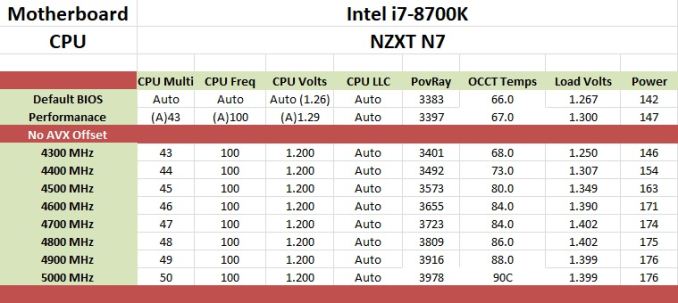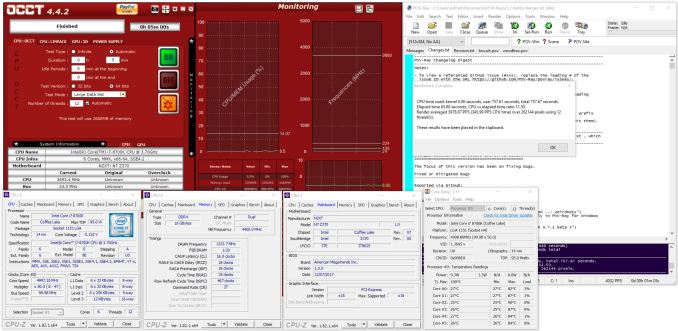The NZXT N7 Z370 Motherboard Review: A New Player in the Motherboard Market
by Joe Shields on January 9, 2018 12:00 PM EST- Posted in
- Motherboards
- Intel
- NZXT
- Coffee Lake
- i7-8700K
Overclocking
Experience with the NZXT N7
Our overclocking adventures with the NZXT N7 in the end worked out well. I was able to achieve a clock speed of 5 GHz and was limited by temperature (due to the voltage - more on that in a bit). Though new, the NZXT N7 does have a performance option in the BIOS, however, it appears it didn't really do much. When flipping it over the core ratio raised from 43 to 46, but the individual cores for turbo did not change. I had expected to see it now boost all cores to 4.6 GHz when testing but it stayed the same at 4.3 GHz for POVRay and the Prime95 testing potentially suggesting an AVX offset is in play, but we do not have AVX offset settings to check.
The BIOS on the N7 offers the vast majority of overclocking options people need but is lacking a few others. The BIOS does not have the ability to set the Vcore with an offset or adaptive voltage and uses a static value. There are many of those who prefer an offset to save power while in idle or the CPU not ramping up all the way. Windows power plans can help, but inevitably some prefer that method which is not found in the BIOS. Also not found is Load Line Calibration to combat vdroop.
Our manual overclock was not without quirky behavior as well. Typically when one sets a manual voltage, we see very close to that voltage on load, give or take vdrop/vdroop. THe N7 though appears to have some kind of adaptive voltage going on behind the scenes as the voltage went up with the CPU multiplier. Setting the voltage at 1.2V with a multiplier of 43 had the voltage hit 1.25V. A 44x multiplier yielded 1.3V and 45x 1.35V and so on until it peaked at 1.4V - all the while manually set at 1.2V. What happens here it becomes more difficult to achieve an optimal overclock (using the least amount of voltage needed for a giving clock) which causes more power use and higher temperatures. Typically, these processors can reach 5 GHz around 1.3-1.35V and much less, nearly stock voltage around the 4.5 GHz mark. In this case, it would be using 0.25V more than needed at that clock speed and could potentially lop off a couple hundred MHz from the overclock without adjusting the voltage down. Another personality trait of this board a bit different than the rest is the reset button. When pressing it, the board fully powers down, then powers back up instead of a power 'blip' as we experience on most boards.
In the end, the BIOS has the necessary options to overclock, but not all of the options we come to expect in a midrange motherboard. Overclocking is more of a brute force type of function here without a lot of fine tuning ability from within the BIOS. Where other boards are more refined and have worked out a lot of those kinks, we have to remember this is their first shot at it. You can easily overclock as we have seen below, but until the issue is fixed, you will be forced to use the CAM software and voltage offsets in order to reach an optimized overclock. With input, time, and subsequent BIOS releases, we imagine these options to show up and other improvements made to the board and BIOS mature.
Overclocking Methodology
Our standard overclocking methodology is as follows. We select the automatic overclock options and test for stability with POV-Ray and OCCT to simulate high-end workloads. These stability tests aim to catch any immediate causes for memory or CPU errors.
For manual overclocks, based on the information gathered from the previous testing, starts off at a nominal voltage and CPU multiplier, and the multiplier is increased until the stability tests are failed. The CPU voltage is increased gradually until the stability tests are passed, and the process repeated until the motherboard reduces the multiplier automatically (due to safety protocol) or the CPU temperature reaches a stupidly high level (90ºC+). Our test bed is not in a case, which should push overclocks higher with fresher (cooler) air.
Overclocking Results
The N7 took our i7-8700K to 5 GHz and was no worse for the wear after our brief stress testing (even at 1.4V). The CAM software nor the BIOS have sensors for the VRM, but they were warm to the touch after an extended stress test with OCCT. Our main issue with overclocking is the overvoltage situation. While there is a way around that, it shouldn't work in that way. Once it is resolved, the N7 is just as capable as any other board












60 Comments
View All Comments
Tunrip - Tuesday, January 9, 2018 - link
I appreciate I don't read as much as I used to, but I've been reading Anandtech for 20 years and this is the most confusing first page of an article I've ever read."Default performance on this board was tough to compare as we only have datasets with varied Uncore frequencies. However, that seems to be a function of the motherboard and will vary throughout the Z370 testing. It is tough to compare it directly to the i9-7900X because of its difference in core/thread count as well cost. We can almost purchase three i7 8700Ks for one 7900X."
1. What is Uncore?
2. Regarding this sentence in particular: "to compare it directly to the i9-7900X" I don't understand; you are trying to compare this motherboard to a CPU?
3. "We can almost purchase three i7 8700Ks for one 7900X." ... Ok? What is the significance of that to this review?
I apologise if I sound harsh, but I was fascinated to read about this unusual motherboard. Anandtech has been my "go to" site for years and I was excited to see this article, but I'm left feeling confused before I've even finished reading the first page.
Joe Shields - Tuesday, January 9, 2018 - link
Thanks for the input.1. Uncore is Non core parts of the CPU like Cache/Memory Controller, etc.
2. Its intent is to was to setup the fact that the only datasets I had available were the 7900X ones (otherwise it would have been two others with different uncores which I threw in there to at least have an apples to apples type of comparison.
3. When comparing performance, many people attach $ to it.
That paragraph could be improved indeed.
JohnMD1022 - Tuesday, January 9, 2018 - link
Shouldn't that be "transcore" and "ciscore"?lol
JoeyJoJo123 - Tuesday, January 9, 2018 - link
Ayyyyyyyy, gender memes in tech articles. Good one! I enjoy your witty sense of humor! You should feel good about yourself today for making that stretch.we - Tuesday, January 9, 2018 - link
Terms from gender ideology, which is all about extreme self-deception and lack of self-esteem, really don't lend themselves well as descriptors in any area of science and technology, whether with or without humerous intent.Death666Angel - Tuesday, January 9, 2018 - link
Honestly, I just don't get it. But trans and cis are technical/science terms. They are used in chemistry all the time and to denounce psychology like that is rather ignorant.we - Tuesday, January 9, 2018 - link
@Death666Angel, Aha, was their scientific usage the implied reference? Anyhow, under the umbrella of psychology you'll find some proper science, but also a lot of nonsense. Sigmund Freud started it by speculating about early childhood sexuality. These theories have increasingly found their way into mainstream psychology during the last two decades, but they remain speculation and have no sound scientific basis. Same applies to gender ideology.Death666Angel - Wednesday, January 10, 2018 - link
Well, whatever the reason may be for someone identifying as "trans" or "cis" in a gender context, what is unscientific about it? It is merely a descriptor for what kind of state they identify as. And science is nothing if not description first and foremost.mapesdhs - Wednesday, January 10, 2018 - link
It's unscientific in a gender context because people who "identify" in that way are doing so based on *feelings*, which is not an argument.we - Thursday, January 11, 2018 - link
Collecting data based on self-reporting just stands at the beginning of a scientific inquiry. Insights should be based on proper scientific evaluation of the data, not on inferential jumps. The vast majority of human beings develop happily with their gender identity in accordance with their biological sex, but gender ideologists claim: it is a fact that dna only determines sex but not gender; a transgender state of mind is a natural state of identity (and healthy - if it was not for distress caused by the wrong body!); the correct response is affirmation by all involved (friends, family, teachers, physicians etc.); in the case of young persons it is desirable to propose puberty blockers, - without any conclusive scientific evidence to prove any of those claims. This is now very much off topic, so I will stop now. If you are interested in this topic, you could start a thread in an appropriate section of the forum, but you may find that technically and scientifically minded contributors show little support for gender ideology.